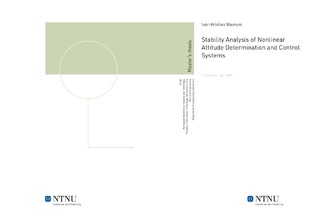Stability Analysis of Nonlinear Attitude Determination and Control Systems
Master thesis
Permanent lenke
http://hdl.handle.net/11250/259612Utgivelsesdato
2007Metadata
Vis full innførselSamlinger
Sammendrag
This report describes the modelling and performance of an attitude determination and control system (ADCS) for a small satellite in lunar orbit. The focus is on stability analyses of each of the components in the system, and of the system as a whole. In connection to this, the separation principle for nonlinear systems is investigated. Central background information is presented, covering necessary rigid body dynamics and stability properties. Three different controller types are analysed and compared herein, namely a model-dependent linearizing controller, a robust controller and a standard PD-controller. An observer is chosen based on earlier work, but some detail modifications are made to its structure. A state-space model of the satellite and environment is derived and implemented in Matlab, along with the observer and controllers. The observer and all three controllers are shown to be stable with Lyapunov analysis. The total ADCS including the observer is shown to have a cascaded structure, on which theory of nonlinear separation principles is used to establish stability properties of the total system. Finally, the ADCS is put to simulation tests imitating real-life scenarios and the performance of the different controllers are compared. The PD-controller shows the best performance, both in speed of convergence and robustness to model errors. While not completely satisfactory, the results give a basis on which to perform further work.
